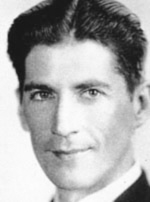Herbert Morrison (announcer)
| Herbert Morrison | |
|---|---|
 |
|
| Born | May 14, 1905 United States |
| Died | January 10, 1989 (aged 83) United States |
| Occupation | Radio journalist |
Herbert O. "Herb" Morrison (May 14, 1905 – January 10, 1989) was an American radio journalist best known for his dramatic report of the Hindenburg disaster, a catastrophic fire that destroyed the LZ 129 Hindenburg zeppelin on May 6, 1937, killing 36 people.
Morrison and engineer Charlie Nehlsen had been assigned by station WLS in Chicago to cover the arrival of the Hindenburg in New Jersey for delayed broadcast.
Radio network policy in those days forbade the use of recorded material except for sound effects on dramas, and Morrison and Nehlsen had no facilities for live broadcast. Still the results became the prototype for news broadcasting in the war years to follow. The fame of this recording had no effect on network policies, however, and it was not until after the end of World War II that recordings were regularly used.
Morrison's description began routinely but changed instantly as the airship burst into flames:
(Complete recording here.)
Morrison and Nehlsen continued their work, reporting at length on the rescue efforts and interviewing survivors, with several pauses while Morrison composes himself. A small and dashing looking man, Morrison wore a blue serge suit and a topcoat. Morrison mistakenly thought there were 106 people aboard the flight, when in reality there were 97 aboard. Thirty-five people died in addition to one fatality on the ground. The 16-inch green lacquer disk recordings were rushed back to Chicago by airplane and broadcast in full later that night. Portions were rebroadcast nationally by the NBC Radio network the next day. It was the first time recordings of a news event were ever broadcast, and also the first coast-to-coast radio broadcast. Morrison's quick professional response and accurate description combined with his own emotional reaction have made the recordings a classic of audio history.
Several people believe that this classic recording is not an accurate reflection of Morrison's speech. These people theorize that Nehlsen's Presto 6D recorder ran about 3% slow, causing Morrison's voice to sound different from how it actually was, and that Morrison's normal speaking and radio announcer voice was actually quite deep as evidenced by other recordings of his voice from the same era.
...
Wikipedia
